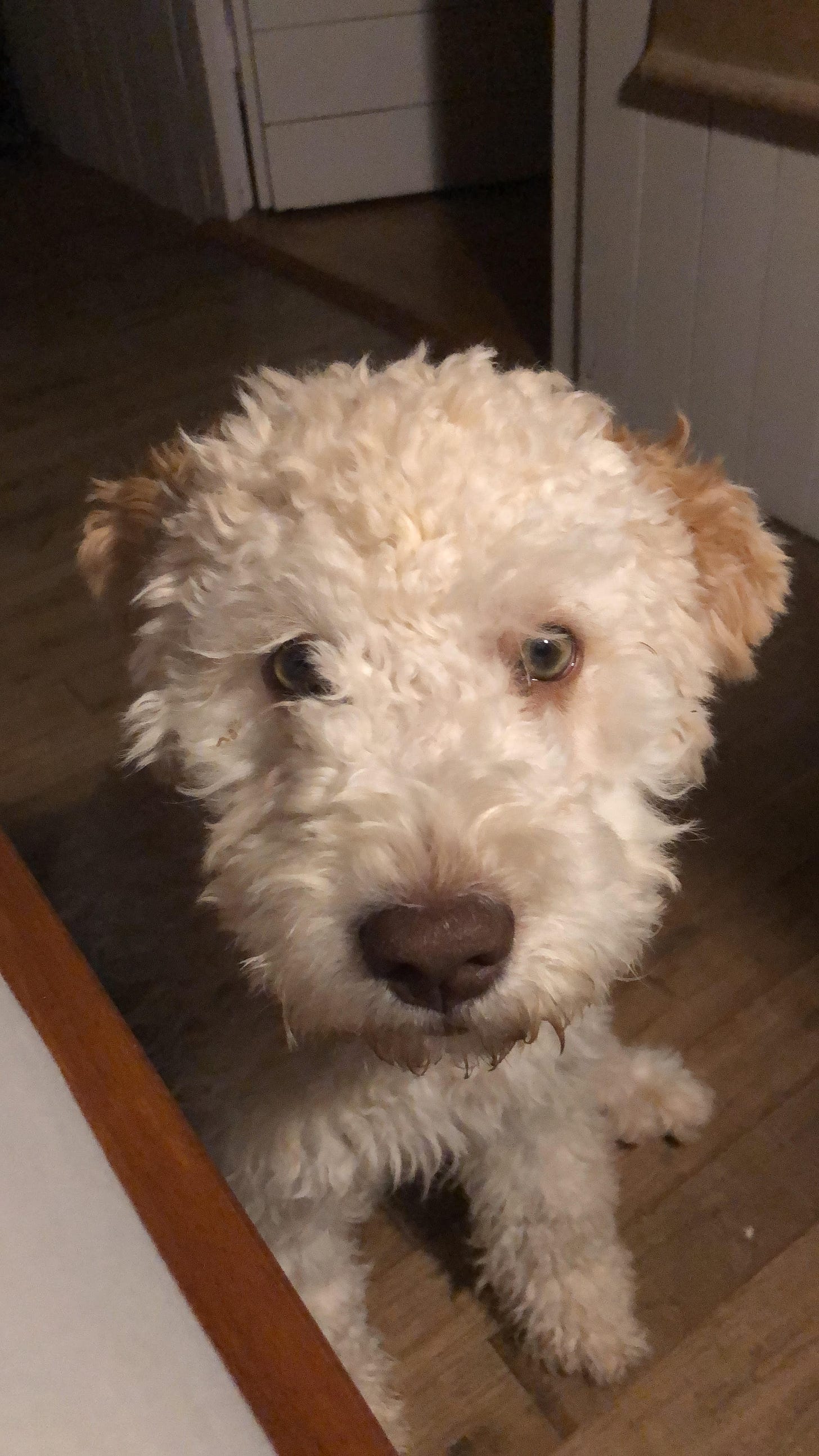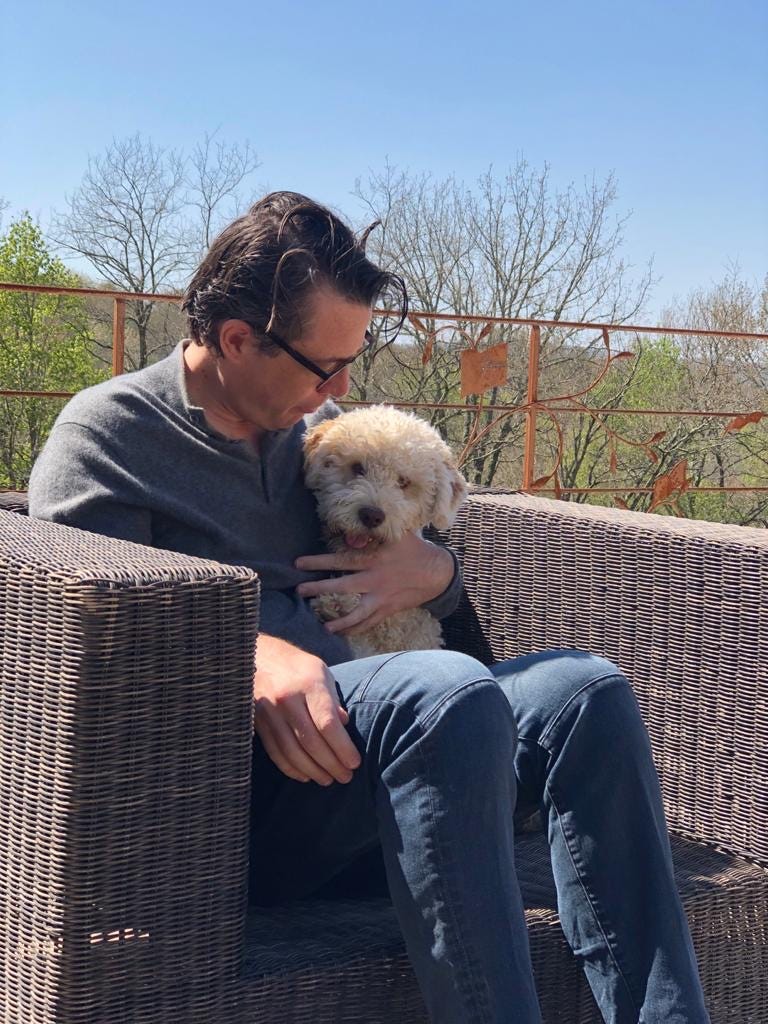The compulsory carnivore
What's the connection between meat and politics?
If you are enjoying these missives and you haven’t yet done so (and can afford it: I know a lot of people are having a rough time these days), please consider upgrading to a paid subscription! It really helps keep this thing going, and I’m about to start doing new subscriber-only posts.
The other night, at bedtime, my little puppy, Basso, wouldn’t settle down. He kept biting my hand and running around and yapping. I ignored him and tried to sleep but he kept waking me up. I thought he was just being annoying—though he’s not annoying, not at all: at bedtime, he curls into the shape of a muffin, closes his eyes, and snores the night away, only occasionally grumbling at someone in his dreams, or getting freaked out by an obstreperous owl.
A few hours later, it was clear that something was really wrong. He couldn’t stand up. He looked scared. We called the vet, who agreed to meet us at 4:30 in the morning, and drove him down the winding roads to her clinic.
All the time, he was in my arms. Cheeky waggly Basso was a trembling scrap of fur. Even at his halest, he’s not a big guy, just fourteen kilos, but now he seemed tiny. His jaws—terror of so many shoes, shredders of so much upholstery—were so fragile, no wider than my little finger at their tip. His whole head fit easily into my hand. The legs with which he darts up hillsides were matchsticks, and his face looked at me in fear.
To get an idea of why this was heartbreaking, please consider the face in question. This is how he usually looks when he wakes me up at the crack of dawn, ready to run around and poop.
This is someone you would never, ever want to see suffer. He is so trusting and friendly, so eager to learn new tricks, so happy to lie on the freshly cut grass and get his tummy scratched. Sometimes he’s brave and sometimes he’s scared. Some foods he likes and some foods he hates. There are people he takes to immediately and others he doesn’t trust at all, no matter how many treats they give him. Sometimes he’s outgoing and sometimes he stares, pensive and melancholy, at the sky. Sometimes he’s wide awake and sometimes he’s sleepy. He is, like you and me, a fully individual creature, with a full range of emotions.
So it is a true horror to realize that there are people who would deliberately hurt him. Not him personally. We don’t usually eat dogs. But animals very similar to him are tortured and killed by the billions. (Brace yourself and click here if you want to learn how many.) The face of a dog might be a little bit different from the face of a cat or a pig or a cow or a lamb.
But the eyes are the same.
The emotions are the same.
Or more: to see little Basso in pain is to see that he is all feeling, all emotion. He doesn’t have language to camouflage his terror. He can’t tell me what’s wrong. He can’t ask for help. He can’t understand my words: We’re almost at the hospital, The doctor’s here, You’re going to be ok.
Clarice Lispector once said that she didn’t know how to transform her feelings about the social injustice of Brazil into ‘the vehemence of art.’ I, too, have never known how to express my feelings about the murder of animals. It upsets me so much that it might be the deepest emotion of my life. If the word “sin” means anything at all, it must mean: deliberately hurting someone like Basso.
How could anyone—much less nice people—think that a piece of meat on their plate could ever be worth the panicked eyes and racing heart and shaking tail that preceded its arrival?
Over the years, I have morphed from a friendly vegetarian—“Of course I don’t mind if you order the cheeseburger!”—to someone who minds, who really, really minds, if you order the cheeseburger. Someone who, yes, judges you for it: as I judge anyone who would deliberately inflict pain on someone weaker. On someone who can’t fight back. On someone like Basso.
When you decide not to participate in meat-eating, you learn one fascinating thing.
Nobody disagrees with you. I’m not talking about bad people. I’m talking about friends—nice people. In decades of conversations, I don’t think I’ve ever encountered anyone who thinks meat is ok. Most people are repulsed by needless slaughter. Even those who think it’s natural—and you should google “factory farms” if you think there’s anything natural about it—know how bad meat is for our health. They know how terrible it is for the environment. They know it’s a leading factor in global warming.
So … why? What it comes down to is that people eat meat because it is normal in their culture. They’re used to it. They themselves would be horrified at the thought of slitting an animal’s throat. But they aren’t too troubled if this work is outsourced to others. They find a way to put those faces out of their minds. I know this because I was the same way; I ate meat until I was in my twenties.
Here’s another thing you learn. Meat isn’t so much a food or a cultural practice. It’s an ideology.
Jews recognize this kind of ideology.
To Jews, Christians aren’t just another religious group. They belong to an ideology that, in some ways, will always want to destroy you. It’s strange how you know this. I never encountered the slightest antisemitism. But it’s something that, from early childhood, I knew.
(I remember reading that the Rwandan Tutsis, in almost every way indistinguishable from the Hutus, knew they’d be attacked eventually. How did they know? by knowing.)
Gay people know that heterosexuality is a church, and that it punishes apostates. In her great essay “Compulsory Heterosexuality and Lesbian Existence,” Adrienne Rich describes how the equation of heterosexuality with normality was enforced by a repressive apparatus that often led to the murder, including by the state, of the abnormal. You need an ideology in order to keep an apparatus like this going. This is called “manufacturing consent.”
I might be naive. But I really don’t think that, given all the choices we have today in our supermarkets, most people would choose to eat the hacked-off bits of enslaved animals who died in terror and blood. That people did this in the past, fine. People did a lot of things in the past. But now? I don’t think this is something in which most people would willingly participate.
That’s why that ideology enforcement is so important.
Meat has long been contentious here in France. You most often see it as a way to bully Muslims, for example by insisting on serving pork in public settings. But recently there’s been another turn that shows just how fiercely meat will be defended.
At the end of February, the mayor of Lyon announced that, as a temporary measure, primary school children would be offered meatless options in the school cafeteria. This was in part because the Covid restrictions allowed schools to serve fewer kids at a time, meaning that the schools needed to simplify their menus.
This set off a round of tweeted insults from the national government. It was a “scandalous ideology,” according to the blowhard Minister of the Interior, Gérard Darmanin, an “unacceptable insult to French farmers and butchers.”
(If you’re thinking: This sounds like the kind of symbolic posturing an incompetent government would embrace at a time when thousands of people are still dying of Covid amidst a failure to vaccinate the population, you would be … correct.)
Carnivorism, like heterosexuality, was to be compulsory.
In March, some right-wing parents sued, and lost. As more and more ink flowed, the National Assembly (!) or Congress got involved. At a time when French ICUs are at 118.2% occupancy, you might think that the deputies have better things to do.
Their involvement, though, is revealing. Adrienne Rich wrote that, whatever else it may have been, heterosexuality is a political institution, enforced and policed. If meat were simply a taste or a preference, it wouldn’t need this kind of vehemence.
There’s a panic in the meat industry now. Although only 5% of the French are vegetarians or vegans, 12% of people 18-25 are, and 30% of the population are “flexitarians,” which at the very least means sympathetic to the arguments against eating meat, or eating much of it. These numbers are increasing, and will increase further still.
The shift in my own social circles—which, I sadly note, no longer actually exist—is palpable. A few years ago, vegetarianism was eccentric. You had to reassure the host that you didn’t mind nibbling at the salad.
Now, it’s the other way around. People planning to serve dead animals apologize in advance. More and more hosts avoid the awkwardness by simply serving vegetarian food.
These developments remind me of the days when compulsory heterosexuality began to crumble. There were little signs, but within just a few years they added up to a great change. People who used to ask if a man had a girlfriend started asking instead if he was seeing anyone. Parents started allowing for the possibility that their children might be gay.
Lots of people freaked out, of course. There was an intense, decades-long reaction. But it’s a good sign when people resort to the kind of bullying we are now seeing of initiatives to promote vegetarianism. Bullying, after all, is what you do when you can’t win on the merits.
Basso had eaten something that gave him diarrhea. He was dehydrated, so the vet hooked him up to the world’s most tragic saline bag. It was terrible to have to leave him behind for a few hours. But when we came back he was so overjoyed to see us that he peed all over the floor. That afternoon we sat out on the porch together.



The way you write about Basso feeling not well, was breaking my heart. Monique Taillie
When you read a book and want to know how it ends, you should never have a peak at the last pages. Well, in this case I really wanted to know if Basso is alright, so I skipped most parts (the one’s that didn't have the name Basso in it. Now I know that he is alright, I will read your post again :-).